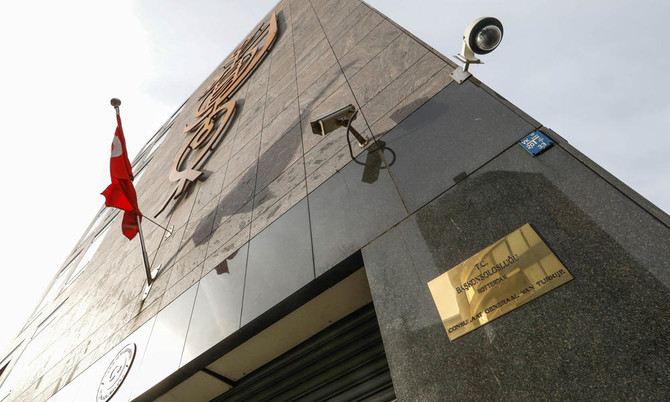ISTANBUL: Turkish President Recep Tayyip Erdogan on Saturday likened a Dutch ban on his foreign minister’s visit to Nazism, in a dramatic escalation of a row over campaign events abroad for Turkey’s high stakes referendum.
The leader’s strongly-worded comments came after The Hague said it would refuse Foreign Minister Mevlut Cavusoglu’s plane permission to land ahead of a rally to gather support for boosting Erdogan’s powers.
The Dutch decision to ban Cavusoglu from visiting and holding a rally in the port city of Rotterdam came after Germany and other European nations also saw moves to block campaign events.
Unlike in Germany, however, where a string of planned rallies were barred by local authorities, in the Netherlands it was the government that stepped in to block Cavusoglu’s visit.
“They are the vestiges of the Nazis, they are fascists,” Erdogan told an Istanbul rally Saturday, days after he angrily compared moves to block rallies in Germany to “Nazi practices.”
“Ban our foreign minister from flying however much you like, but from now on let’s see how your flights will land in Turkey,” Erdogan said.
The Turkish foreign ministry swiftly announced it had summoned the Dutch deputy ambassador in protest over the ban. The Dutch government said in a statement that its decision to bar Cavusoglu from visiting followed a Turkish threat of sanctions.
“For that reason the Netherlands has let it be known it will withdraw permission to land” for the minister’s plane, it said.
Turkish diaspora
The Netherlands is home to some 400,000 people of Turkish origin, and Ankara is keen to harness votes of the diaspora in Europe ahead of the April 16 referendum.
Erdogan accused the Netherlands of working against the “Yes” campaign and said: “Pressure however much you like. Abet terrorists in your country however much you like.
“It will backlash, and there’s no doubt that we’ll start retaliating after April 16... We are patient. Whoever is patient will reach victory.”
The latest escalation came after a string of European towns and cities canceled similar campaign rallies, citing logistical difficulties and security concerns.
Dutch Foreign Minister Bert Koenders had warned Thursday that his government would not facilitate Cavusoglu’s visit.
“We will not participate in a visit by a Turkish government official who wants to conduct a political campaign for a referendum,” he said.
Dutch far-right anti-Islam MP Geert Wilders celebrated the government’s ban, attributing it to “heavy PVV pressure,” in a reference to his party.
“I call on Prime Minister (Mark) Rutte, in the name of millions of Dutch people, to refuse the Turkish minister access to the Netherlands!” he tweeted earlier Saturday.
“Don’t let him land here!” wrote Wilders, whose party appears set to emerge as one of the largest in parliament in Wednesday’s vote.
Turkey-Germany row
The latest row came after NATO allies Turkey and Germany sparred over the cancelation of a series of referendum campaign events there.
Germany is home to 1.4 million people eligible to vote in Turkey — the fourth-largest electoral base after Istanbul, Ankara and Izmir.
Although Berlin insisted that the string of cancelations by local authorities were down to logistical reasons, Turkish officials repeatedly hit back, leading to Erdogan’s angry “Nazi” remark.
German Chancellor Angela Merkel said such rhetoric was “depressing,” belittled Holocaust victims and was “so out of place as to be unworthy of serious comment.”
Berlin has emerged as a strident critic of Ankara’s vast crackdown in the wake of the attempted putsch of last July, which has seen more than 100,000 people arrested, suspended from their jobs or sacked for alleged links to the plotters or to Kurdish militants.
Ankara has in turn accused Berlin of harboring “terrorists” and failing to respond to requests to hand over suspects from the coup as well as Kurdish militants who it believes are members of the outlawed PKK group.
Elsewhere in Europe, Austrian Chancellor Christian Kern has called for an EU ban on Turkish politicians campaigning for the referendum.
And Swiss police on Friday blocked a rally supporting a “yes” vote in the referendum, amid uncertainty over whether the Turkish foreign minister would be allowed to host a similar event planned for Zurich this weekend.

























